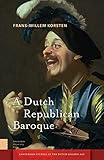A Dutch republican baroque : theatricality, dramatization, moment, and event / Frans-Willem Korsten.
Material type: TextSeries: Publication details: Amsterdam : Amsterdam University Press, (c)2017.Description: 1 online resource (231 pages, 16 unnumbered pages of plates) : color illustrationsContent type:
TextSeries: Publication details: Amsterdam : Amsterdam University Press, (c)2017.Description: 1 online resource (231 pages, 16 unnumbered pages of plates) : color illustrationsContent type: - text
- computer
- online resource
- 9789048532056
- 9048532051
- PN2712 .D883 2017
- COPYRIGHT NOT covered - Click this link to request copyright permission: https://lib.ciu.edu/copyright-request-form
| Item type | Current library | Collection | Call number | URL | Status | Date due | Barcode | |
|---|---|---|---|---|---|---|---|---|
 Online Book (LOGIN USING YOUR MY CIU LOGIN AND PASSWORD)
Online Book (LOGIN USING YOUR MY CIU LOGIN AND PASSWORD)
|
G. Allen Fleece Library ONLINE | Non-fiction | PN2712 (Browse shelf(Opens below)) | Link to resource | Available | on1020788602 |
Includes bibliographies and index.
In the Dutch Republic, in its Baroque forms of art, two aesthetic formal modes, theatre and drama, were dynamically related to two political concepts, event and moment. The Dutch version of the Baroque is characterised by a fascination with this world regarded as one possibility out of a plurality of potential worlds. It is this fascination that explains the coincidence in the Dutch Republic, strange at first sight, of Baroque exuberance, irregularity, paradox, and vertigo with scientific rigor, regularity, mathematical logic, and rational distance. In giving a new historical perspective on the Baroque as a specifically Dutch republican one, this study also offers a new and systematic approach towards the interactions among the notions of theatricality, dramatisation, moment, and event: concepts that are currently at the centre of philosophical and political debates but the modern articulation of which can best be considered in the explorations of history and world in the Dutch Republic.
Republican baroque: a thunderclap, a city hall and two executions -- Artifice: multiple worlds and one actualized -- Why a Dutch republican baroque; and why not a Golden Age? -- City hall: affect -- or what moves and what drives -- Thunderclap: moment and event -- Two executions: theatricality and dramatization -- Republican baroque and slavery -- dramatic potential in history: Rome and the Republic -- Grevius, Vondel, Knupfer, and Job -- Two incompatible political models: transfer or disruption? -- Allegory tied into a knot: history's continuity dramatically disrupted -- Perverse powers, or how to make fun of the theater of torture -- Catholic Rome and the figure of Job: subjection to the only possible world -- cruel death of worlds and political incompatibility -- the brothers De Witt -- Foundations of law: the master/father of a political house -- lynching of the De Witts: condensation and spectacle -- ship of state and the cruel political choice between incompatible worlds -- Combat, the dramatic logic of cruelty, and the potential of difference -- Happy Split of Worlds or the Comedic Sublime -- Frans Hals -- Happiness, the comedic, and the sublime -- From Steen to Vondel: comical and tragic counterpoints to the comedic -- sublime intensity of the moment -- Freedom: necessity and contingency -- seas or the world as scene -- Focquenbroch and Grotius -- Pre-colonial mise-en-abyme: Focquenbroch and a non-republican baroque -- Moment of exchange and the non-existent ̀proper' -- Juridical staging: commerce and the seas -- precariousness of mise-en-scene -- Amsterdam: city and sea as world scene -- Not a frame but a lens: the touch of knowledge -- Rumphius, Vossius, Spinoza -- Spectacle or theater: Rumphius as knowledge-trader -- Nature internalized: res cogitans reconsidered -- Sensing the world differently: the telescope -- Reading through a lens: intensity and texture before scripture -- Public theater, collective drama and the new -- Van den Enden and Huygens -- Theatrum mundi, public acting and the plane of collective imagination -- Speaking for those who understand: a school drama in a theater -- Dramatization: Theatrum mundi versus mundus dramaticus -- Fluid borders between theatricality and dramatization: Huygens' S̀unday' -- Interrupting time for the sake of division: history and the tableau vivant -- Rembrandt (Abraham and Isaac), Quast, Vondel, and Vos -- Abraham and Isaac: the opening of history through the what-if -- virtual: narrative versus interruption -- Fool Waiting for the Political Moment: Tableau Vivant Between Retrospection and Anticipation -- political potential in the tableau and the nature of freedom -- Moment of closure: spectacle and a revolting tableau.
COPYRIGHT NOT covered - Click this link to request copyright permission:
There are no comments on this title.
